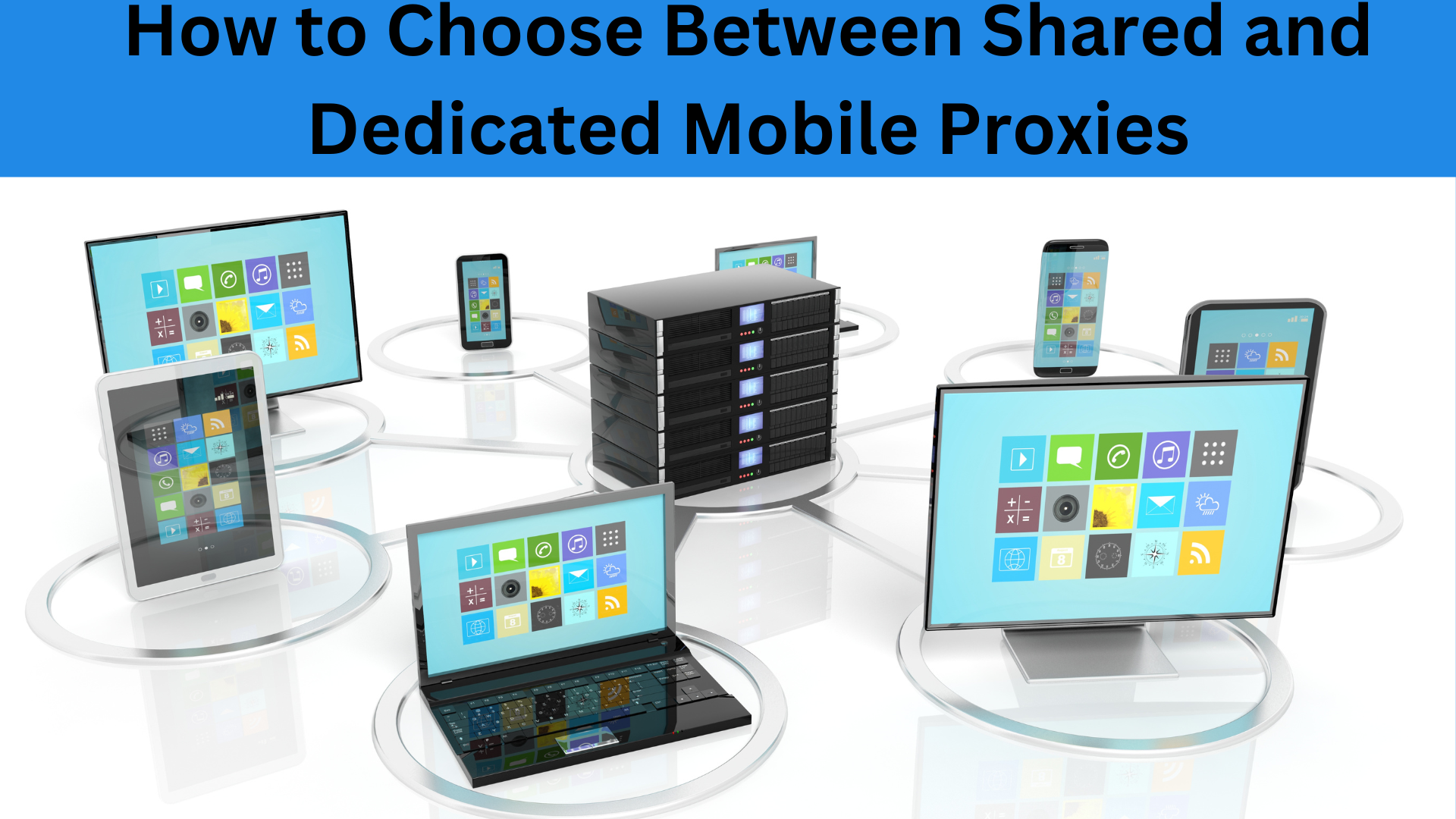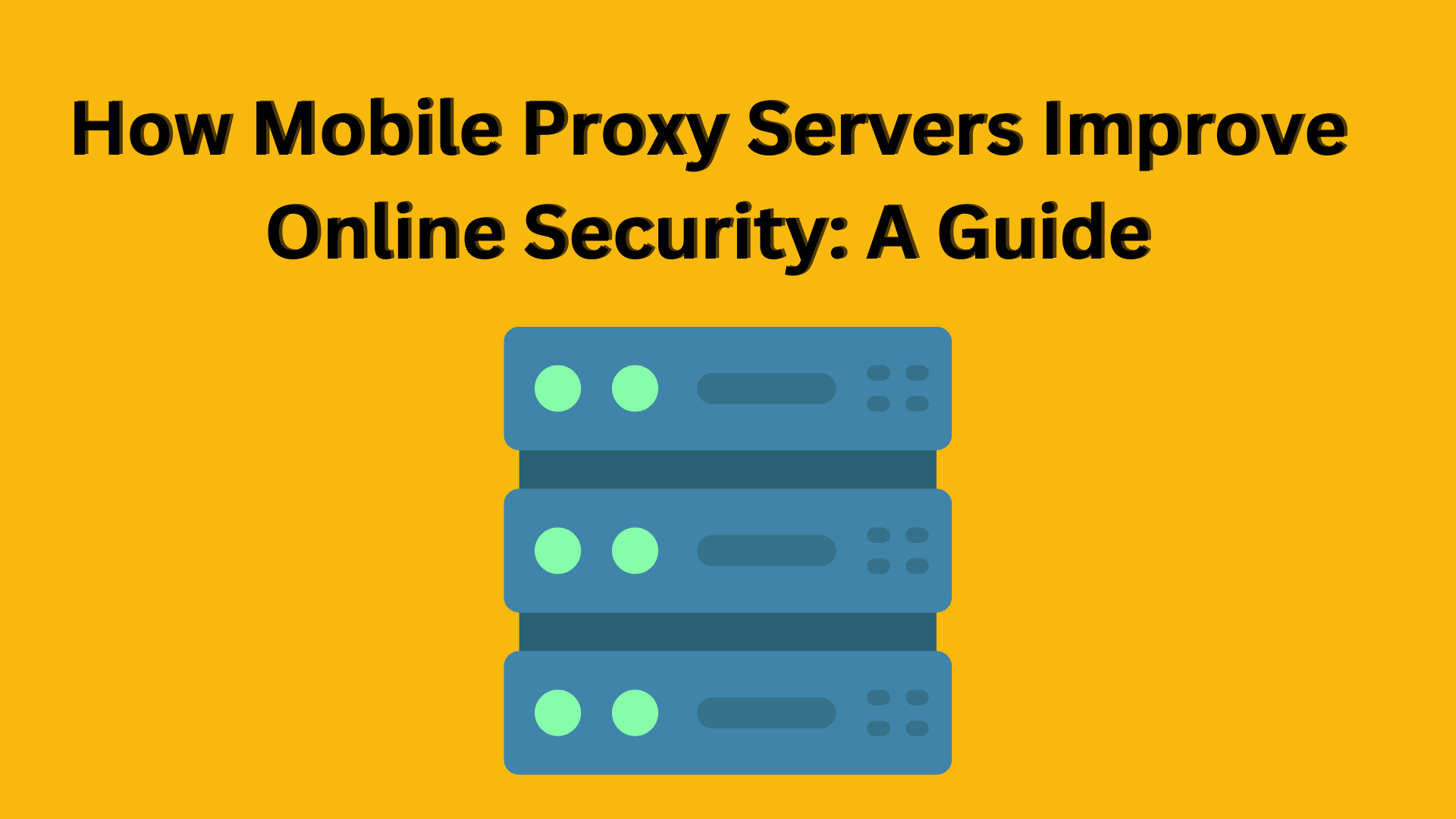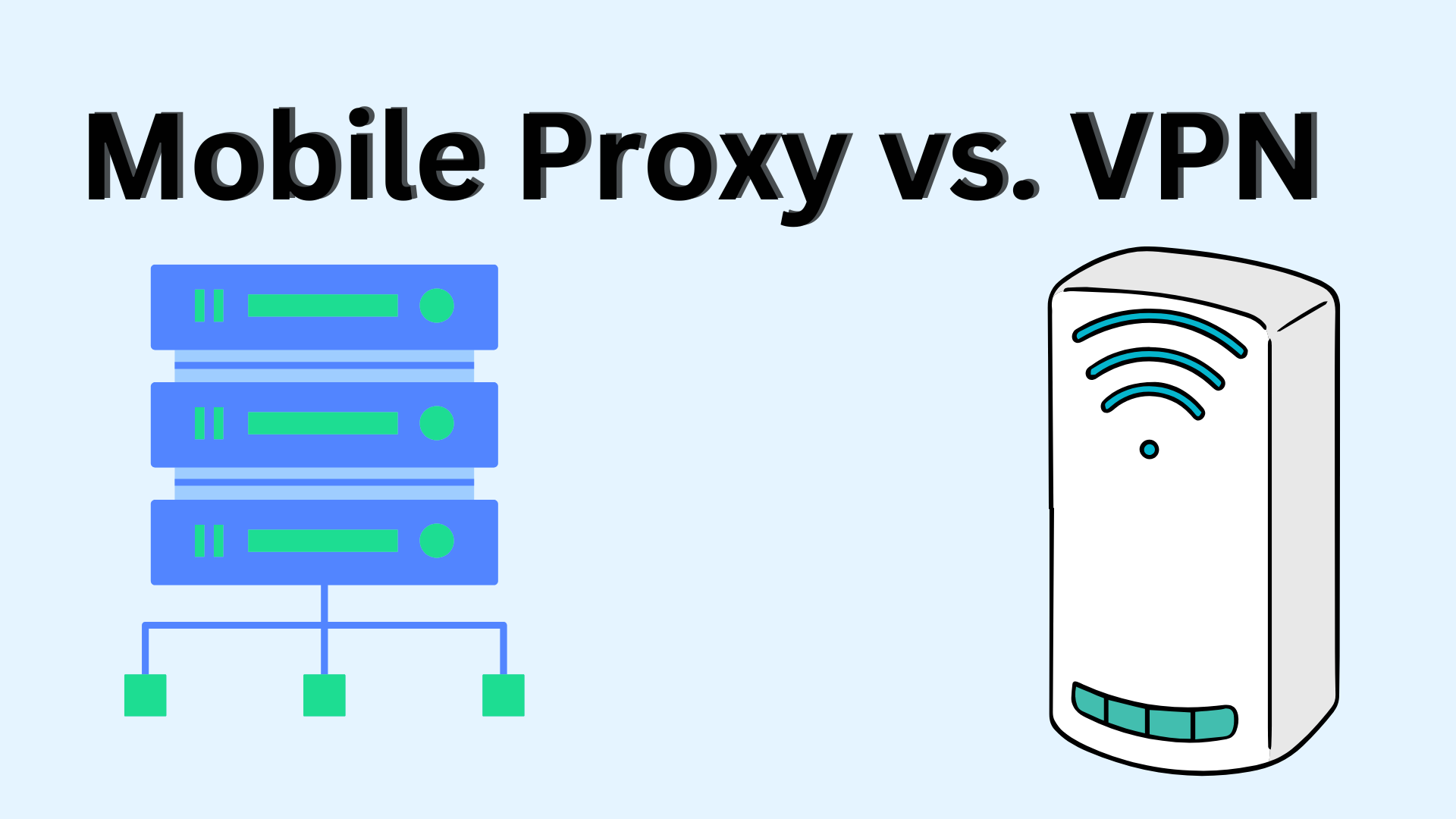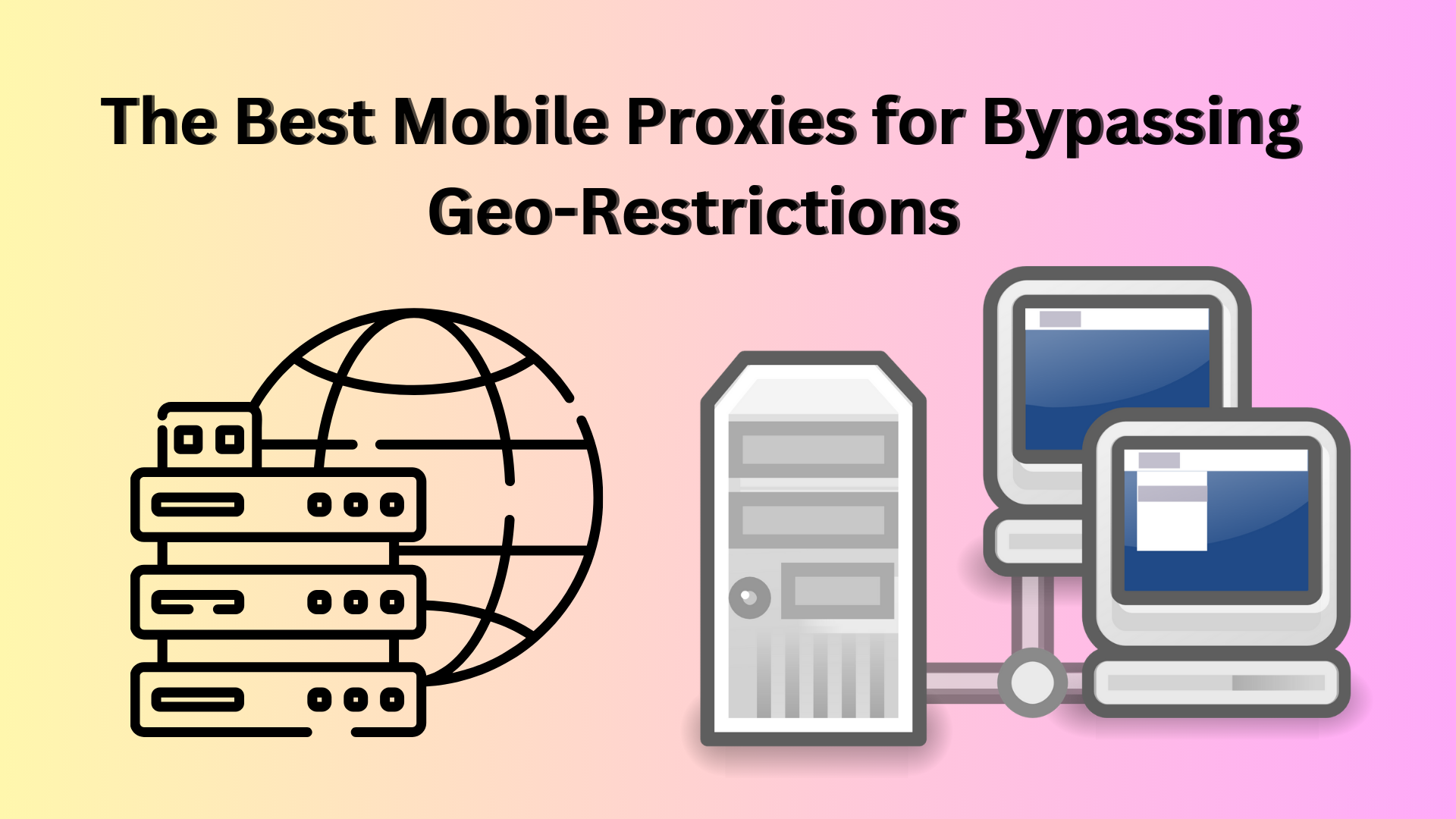Introduction
In today’s digital landscape, proxies have become indispensable for anyone looking to navigate the internet with enhanced privacy, security, and efficiency. With the rise of mobile proxies, users are presented with the option to choose between shared and dedicated proxies. But how do you decide which one is the best fit for your needs? Understanding the differences between shared and dedicated mobile proxies is crucial to making an informed decision.
What Are Mobile Proxies?
Definition and Functionality
Mobile proxies are IP addresses assigned to mobile devices by mobile network operators. They allow users to route their internet traffic through a mobile IP address, making it appear as though they are browsing from a mobile device. This is particularly useful for tasks that require mobile-specific IPs, such as accessing geo-restricted content or managing multiple social media accounts.
The Growing Need for Mobile Proxies
With the increasing reliance on mobile devices for internet access, mobile proxies have become more valuable. They offer an added layer of anonymity and are less likely to be flagged by websites compared to traditional proxies. This growing demand makes it essential to understand the types of mobile proxies available and how to choose the right one.
Shared Mobile Proxies
What Are Shared Mobile Proxies?
Shared mobile proxies are IP addresses that multiple users share. When you use a shared proxy, you are sharing the same IP address with other users. This can lead to a cost-effective solution but comes with its own set of challenges.
Advantages of Shared Mobile Proxies
- Cost-Effective: One of the main benefits of shared mobile proxies is their affordability. Since the cost is distributed among multiple users, shared proxies are often cheaper than dedicated ones.
- Availability: Shared proxies are usually more readily available, making them easier to obtain.
- Flexibility: They are ideal for low-budget operations or tasks that don’t require high levels of security or speed.
Disadvantages of Shared Mobile Proxies
- Security Risks: Since the proxy is shared with others, there’s a higher risk of data breaches or exposure to malicious activities carried out by other users on the same proxy.
- Performance Issues: Shared proxies may experience slower speeds and higher latency due to the traffic from multiple users.
- Potential for IP Bans: If another user on the shared proxy engages in suspicious activities, the IP address could be banned or blacklisted, affecting all users.
Dedicated Mobile Proxies
What Are Dedicated Mobile Proxies?
Dedicated mobile proxies are IP addresses assigned exclusively to a single user. Unlike shared proxies, dedicated proxies offer sole access to the IP address, ensuring better performance and security.
Advantages of Dedicated Mobile Proxies
- Enhanced Security: With dedicated mobile proxies, you don’t have to worry about other users’ activities compromising your security. You have full control over how the IP address is used.
- Better Performance: Since the proxy isn’t shared, you can expect faster speeds and lower latency, which is crucial for tasks that require high performance.
- Reduced Risk of IP Bans: The risk of your IP address being banned is significantly lower since no one else is using it.
Disadvantages of Dedicated Mobile Proxies
- Higher Cost: The main drawback of dedicated proxies is their cost. Since you are the sole user, you bear the entire cost, which can be expensive.
- Limited Availability: Dedicated proxies are often in higher demand and may be harder to find, especially in certain regions.
Key Differences Between Shared and Dedicated Mobile Proxies
Performance
Dedicated proxies offer superior performance compared to shared proxies. With no other users consuming bandwidth, dedicated proxies provide faster speeds and lower latency.
Security
Security is a significant concern when choosing between shared and dedicated proxies. Dedicated proxies offer higher security levels since you’re not sharing the IP address with anyone else, reducing the risk of data breaches.
Cost
Shared proxies are more cost-effective, making them ideal for budget-conscious users. In contrast, dedicated proxies come at a premium price but offer better performance and security.
Use Cases
The choice between shared and dedicated proxies often depends on the use case. Shared proxies are suitable for low-risk, low-budget tasks, while dedicated proxies are better for high-performance, high-security needs.
When to Choose Shared Mobile Proxies
Ideal Scenarios for Shared Proxies
Shared mobile proxies are ideal for users who need a budget-friendly solution for less demanding tasks. If you’re managing multiple social media accounts, conducting basic web scraping, or performing tasks that don’t require high-speed internet, shared proxies can be a good fit.
Budget Considerations
If you’re on a tight budget, shared proxies offer a cost-effective way to access mobile IPs. They allow you to spread the cost across multiple users, making them more affordable than dedicated proxies.
Use Cases
- Social Media Management: For managing multiple social media accounts, shared proxies can be sufficient, especially if you’re not engaging in high-volume activities.
- Basic Web Scraping: Shared proxies can handle basic data scraping tasks, though they may struggle with more intensive scraping operations.
When to Choose Dedicated Mobile Proxies
Ideal Scenarios for Dedicated Proxies
Dedicated mobile proxies are the go-to choice for users who require high performance and enhanced security. If you’re dealing with sensitive data, engaging in high-frequency activities, or need to ensure that your IP address remains unbanned, dedicated proxies are the better option.
Performance Needs
For tasks that demand high speed and low latency, such as competitive intelligence gathering, real-time market research, or automated testing, dedicated proxies offer the reliability and performance you need.
Use Cases
- Ad Verification: For verifying ads in different locations without risking IP bans, dedicated proxies provide the necessary control and reliability.
- High-Volume Data Scraping: When scraping large amounts of data, dedicated proxies ensure that your activities aren’t slowed down by other users.
- Online Privacy: If maintaining online anonymity is a top priority, dedicated proxies offer the best protection against tracking and monitoring.
How to Choose the Right Mobile Proxy Provider
Reliability and Reputation
When selecting a proxy provider, reliability and reputation should be top of mind. Look for providers with positive reviews, a history of delivering high-quality service, and a commitment to customer satisfaction.
Customer Support
Good customer support is essential, especially if you encounter issues with your proxy service. Choose a provider that offers responsive and helpful support to resolve any problems quickly.
Pricing Structure
Examine the provider’s pricing structure to ensure it aligns with your budget. Some providers offer flexible plans that allow you to scale up or down based on your needs, which can be advantageous as your requirements change.
Security Considerations
Protecting Your Data
Ensure that your proxy provider has strong security measures to protect your data. This includes encryption, secure servers, and a commitment to not logging your activities.
Ensuring Anonymity
Anonymity is a key reason for using proxies. Verify that your provider’s proxies effectively mask your IP address and don’t leak your personal information.
Avoiding Blacklisted IPs
Make sure your provider regularly rotates IPs and avoids using blacklisted addresses. This reduces the risk of your proxy being blocked by websites, ensuring smoother operation.
Performance Considerations
Speed and Latency
Performance is critical when choosing a proxy. Look for providers that offer high-speed connections with low latency, especially if you’re performing tasks that require real-time data.
Bandwidth Availability
Ensure that the provider offers sufficient bandwidth for your needs. If you’re engaging in data-heavy activities, such as streaming or large-scale scraping, you’ll need a proxy with generous bandwidth limits.
Uptime and Reliability
Check the provider’s uptime guarantees to ensure that your proxies will be available when you need them. Reliable providers will offer near 100% uptime, ensuring that your operations aren’t interrupted.
Cost Considerations
Budgeting for Proxies
When planning your proxy budget, consider the long-term costs and benefits. While dedicated proxies are more expensive, the added performance and security can be worth the investment for certain use cases.
Cost vs. Value Analysis
Conduct a cost vs. value analysis to determine whether the benefits of a dedicated proxy outweigh the costs. For many users, the increased security and performance justify the higher price.
Long-Term Cost Implications
Consider the long-term implications of your proxy choice. Dedicated proxies may have higher upfront costs, but they can save you money in the long run by reducing the risk of IP bans and improving operational efficiency.
Use Case Scenarios
Social Media Management
For managing multiple social media accounts, shared proxies may suffice. However, if you’re handling high-volume accounts or need to avoid detection, dedicated proxies are the better choice.
Data Scraping
For light scraping tasks, shared proxies can do the job. But for more intensive scraping, dedicated proxies offer the performance and reliability needed to handle large datasets without interruption.
Ad Verification
Dedicated proxies are ideal for ad verification, allowing you to ensure that your ads are being displayed correctly across different locations without risking IP bans.
Market Research
For competitive intelligence and market research, dedicated proxies provide the speed and security necessary to gather accurate data quickly and anonymously.
Common Mistakes to Avoid When Choosing Mobile Proxies
Overlooking Security Features
Don’t overlook the importance of security features when choosing a proxy. Ensure that your provider offers strong encryption, no logging policies, and protection against IP leaks.
Ignoring Provider Reputation
A provider’s reputation is crucial. Avoid providers with poor reviews or a history of unreliable service. Instead, choose a well-established provider known for quality and reliability.
Choosing Based Solely on Price
While cost is important, it shouldn’t be the only factor in your decision. A cheaper proxy may end up costing you more in the long run if it leads to slow performance, security breaches, or IP bans.
Conclusion
Choosing between shared and dedicated mobile proxies depends largely on your specific needs, budget, and use cases. Shared proxies offer an affordable solution for low-risk, low-demand tasks, while dedicated proxies provide superior performance and security for more intensive operations. By understanding the key differences and considering factors like security, performance, and cost, you can make an informed decision that best suits your requirements.
FAQs
- What is the difference between shared and dedicated proxies? Shared proxies are used by multiple users, while dedicated proxies are exclusive to a single user, offering better security and performance.
- Are dedicated mobile proxies more secure? Yes, dedicated proxies are more secure because they are not shared with others, reducing the risk of data breaches and IP bans.
- Can I switch from a shared to a dedicated proxy? Yes, many providers allow you to upgrade from a shared to a dedicated proxy as your needs evolve.
- What are the best use cases for mobile proxies? Mobile proxies are ideal for tasks like social media management, data scraping, ad verification, and market research.
- How do I know if a proxy provider is reliable? Look for providers with positive reviews, strong customer support, and a reputation for high uptime and secure connections.






Pingback: The Legal Aspects of Using Mobile Proxies: What You Need to Know